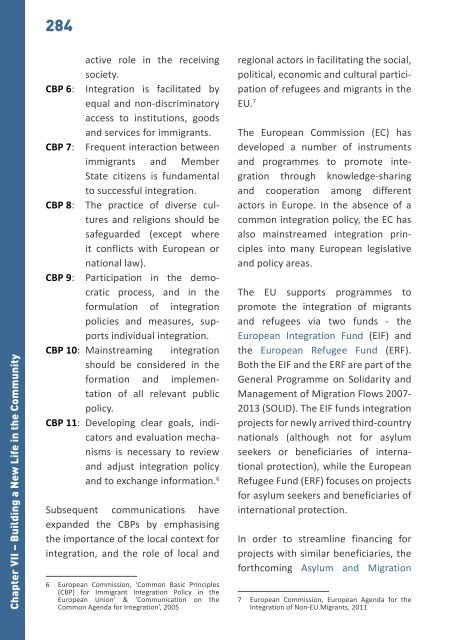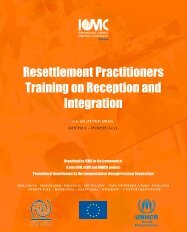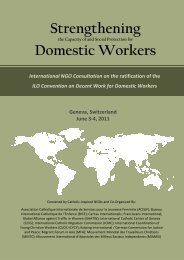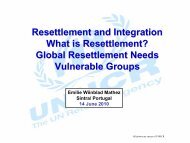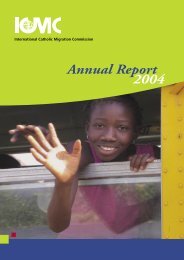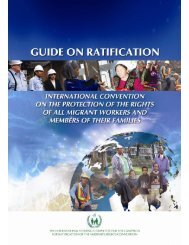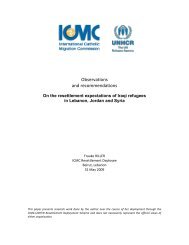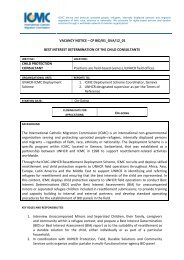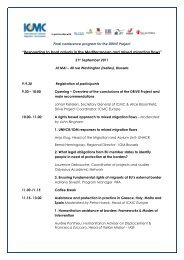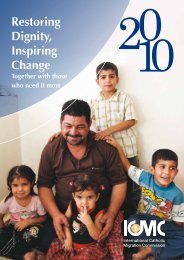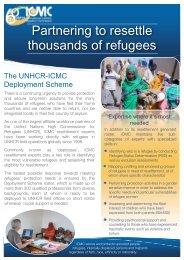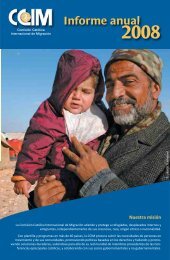ICMCEUROPE WelcometoEurope.pdf (5.89 MB)
ICMCEUROPE WelcometoEurope.pdf (5.89 MB)
ICMCEUROPE WelcometoEurope.pdf (5.89 MB)
You also want an ePaper? Increase the reach of your titles
YUMPU automatically turns print PDFs into web optimized ePapers that Google loves.
284<br />
Chapter VII – Building a New Life in the Community<br />
active role in the receiving<br />
society.<br />
CBP 6: Integration is facilitated by<br />
equal and non-discriminatory<br />
access to institutions, goods<br />
and services for immigrants.<br />
CBP 7: Frequent interaction between<br />
immigrants and Member<br />
State citizens is fundamental<br />
to successful integration.<br />
CBP 8: The practice of diverse cultures<br />
and religions should be<br />
safeguarded (except where<br />
it conflicts with European or<br />
national law).<br />
CBP 9: Participation in the democratic<br />
process, and in the<br />
formulation of integration<br />
policies and measures, supports<br />
individual integration.<br />
CBP 10: Mainstreaming integration<br />
should be considered in the<br />
formation and implementation<br />
of all relevant public<br />
policy.<br />
CBP 11: Developing clear goals, indicators<br />
and evaluation mechanisms<br />
is necessary to review<br />
and adjust integration policy<br />
and to exchange information. 6<br />
Subsequent communications have<br />
expanded the CBPs by emphasising<br />
the importance of the local context for<br />
integration, and the role of local and<br />
6 European Commission, ‘Common Basic Principles<br />
(CBP) for Immigrant Integration Policy in the<br />
European Union’ & ‘Communication on the<br />
Common Agenda for Integration’, 2005<br />
regional actors in facilitating the social,<br />
political, economic and cultural participation<br />
of refugees and migrants in the<br />
EU. 7<br />
The European Commission (EC) has<br />
developed a number of instruments<br />
and programmes to promote integration<br />
through knowledge-sharing<br />
and cooperation among different<br />
actors in Europe. In the absence of a<br />
common integration policy, the EC has<br />
also mainstreamed integration principles<br />
into many European legislative<br />
and policy areas.<br />
The EU supports programmes to<br />
promote the integration of migrants<br />
and refugees via two funds - the<br />
European Integration Fund (EIF) and<br />
the European Refugee Fund (ERF).<br />
Both the EIF and the ERF are part of the<br />
General Programme on Solidarity and<br />
Management of Migration Flows 2007-<br />
2013 (SOLID). The EIF funds integration<br />
projects for newly arrived third-country<br />
nationals (although not for asylum<br />
seekers or beneficiaries of international<br />
protection), while the European<br />
Refugee Fund (ERF) focuses on projects<br />
for asylum seekers and beneficiaries of<br />
international protection.<br />
In order to streamline financing for<br />
projects with similar beneficiaries, the<br />
forthcoming Asylum and Migration<br />
7 European Commission, European Agenda for the<br />
Integration of Non-EU Migrants, 2011


